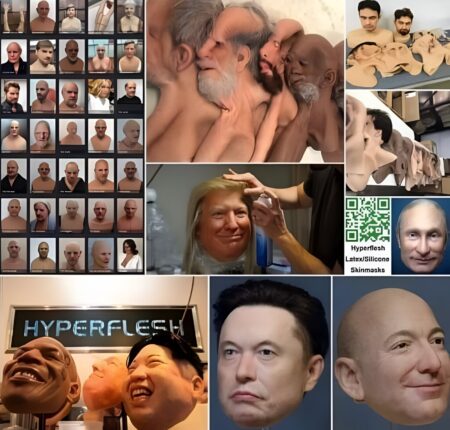Uncle Sam Wants Your DNA: The FBI’s Diabolical Plan To Create A Nation Of Suspects
Medeea Greere, an independent publisher, is now on Telegram at https://t.me/AMGNEWS2022 and exists only on reader support as we publish Truth, Freedom and Love for public awareness. Thank You for your support!
“As more and more data flows from your body and brain to the smart machines via the biometric sensors, it will become easy for corporations and government agencies to know you, manipulate you, and make decisions on your behalf.
“Even more importantly, they could decipher the deep mechanisms of all bodies and brains, and thereby gain the power to engineer life. If we want to prevent a small elite from monopolising such godlike powers, and if we want to prevent humankind from splitting into biological castes, the key question is: who owns the data? Does the data about my DNA, my brain and my life belong to me, to the government, to a corporation, or to the human collective?” ― Professor Yuval Noah Harari

Uncle Sam wants you.
Correction: Uncle Sam wants your DNA!
Actually, if the government gets its hands on your DNA, they as good as have you in their clutches.
Get ready, folks, because the government — helped along by Congress which adopted legislation allowing police to collect and test DNA immediately following arrests, — is embarking on a diabolical campaign to create a nation of suspects predicated on a massive national DNA database.
As the New York Times reports:
“The science-fiction future, in which police can swiftly identify robbers and murderers from discarded soda cans and cigarette butts, has arrived. In 2017, President Trump signed into law the Rapid DNA Act, which, will enable approved police booking stations in several states to connect their Rapid DNA machines to Codis, the national DNA database. Genetic fingerprinting is set to become as routine as the old-fashioned kind.”
Referred to as “magic boxes,” these Rapid DNA machines — portable, about the size of a desktop printer, highly unregulated, far from fool-proof, and so fast that they can produce DNA profiles in less than two hours — allow police to go on fishing expeditions for any hint of possible misconduct using DNA samples.
Journalist Heather Murphy explains:
“As police agencies build out their local DNA databases, they are collecting DNA not only from people who have been charged with major crimes but also, increasingly, from people who are merely deemed suspicious, permanently linking their genetic identities to criminal databases.”
Suspect Society, meet the American police state.
Every dystopian sci-fi film we’ve ever seen is suddenly converging into this present moment in a dangerous trifecta between science, technology and a government that wants to be all-seeing, all-knowing and all-powerful.
By tapping into your phone lines and cell phone communications, the government knows what you say.
By uploading all of your emails, opening your mail, and reading your Facebook posts and text messages, the government knows what you write.
By monitoring your movements with the use of license plate readers, surveillance cameras and other tracking devices, the government knows where you go.
By churning through all of the detritus of your life — what you read, where you go, what you say — the government can predict what you will do.
By mapping the synapses in your brain, scientists — and in turn, the government — will soon know what you remember.
And by accessing your DNA, the government will soon know everything else about you that they don’t already know: your family chart, your ancestry, what you look like, your health history, your inclination to follow orders or chart your own course, etc.
Of course, none of these technologies are foolproof.
Nor are they immune from tampering, hacking or user bias.
Nevertheless, they have become a convenient tool in the hands of government agents to render null and void the Constitution’s requirements of privacy and its prohibitions against unreasonable searches and seizures.
Consequently, no longer are we “innocent until proven guilty” in the face of DNA evidence that places us at the scene of a crime, behavior sensing technology that interprets our body temperature and facial tics as suspicious, and government surveillance devices that cross-check our biometrics, license plates and DNA against a growing database of unsolved crimes and potential criminals.
The government’s questionable acquisition and use of DNA to identify individuals and “solve” crimes has come under particular scrutiny in recent years.
The government was required to at least observe some basic restrictions on when, where and how it could access someone’s DNA. That has all been turned on its head by various U.S. Supreme Court rulings that pave the way for suspicionless searches and herald the loss of privacy on a cellular level.
Certainly, it was difficult enough trying to protect our privacy in the wake of a 2013 Supreme Court ruling in Maryland v. King that likened DNA collection to photographing and fingerprinting suspects when they are booked, thereby allowing the government to take DNA samples from people merely “arrested” in connection with “serious” crimes.
Justice Antonin Scalia’s dissent in Maryland v. King is worth reading not only for the history lesson on the Fourth Amendment but for its clear-sighted rebuke of the police state’s tendency to justify every encroachment on our freedoms as necessary for security.
As Scalia noted:
“Solving unsolved crimes is a noble objective, but it occupies a lower place in the American pantheon of noble objectives than the protection of our people from suspicionless law-enforcement searches… Make no mistake about it: As an entirely predictable consequence of today’s decision, your DNA can be taken and entered into a national DNA database if you are ever arrested, rightly or wrongly, and for whatever reason.
“Today’s judgment will, to be sure, have the beneficial effect of solving more crimes; then again, so would the taking of DNA samples from anyone who flies on an airplane (surely the Transportation Security Administration needs to know the “identity” of the flying public), applies for a driver’s license, or attends a public school. Perhaps the construction of such a genetic panopticon is wise. But I doubt that the proud men who wrote the charter of our liberties would have been so eager to open their mouths for royal inspection.”
The Court’s decision to let stand the Maryland Court of Appeals’ ruling in Raynor v. Maryland, which essentially determined that individuals do not have a right to privacy when it comes to their DNA, made Americans even more vulnerable to the government accessing, analyzing and storing their DNA without their knowledge or permission.
Although Glenn Raynor, a suspected rapist, willingly agreed to be questioned by police, he refused to provide them with a DNA sample.
No problem. Police simply swabbed the chair in which Raynor had been sitting and took what he refused to voluntarily provide.
Raynor’s DNA was a match, and the suspect became a convict.
As the dissenting opinion in Raynor for the Maryland Court of Appeals rightly warned, “a person desiring to keep her DNA profile private, must conduct her public affairs in a hermetically sealed hazmat suit…. The Majority’s holding means that a person can no longer vote, participate in a jury, or obtain a driver’s license, without opening up his genetic material for state collection and codification.”
Yet in refusing to hear the case, the U.S. Supreme Court gave its tacit approval for government agents to collect shed DNA, likening it to a person’s fingerprints or the color of their hair, eyes or skin.
Whereas fingerprint technology created a watershed moment for police in their ability to “crack” a case, DNA technology is now being hailed by law enforcement agencies as the magic bullet in crime solving.
It’s what police like to refer to a “modern fingerprint.”
However, unlike a fingerprint, a DNA print reveals everything about “who we are, where we come from, and who we will be.”
With such a powerful tool at their disposal, it was inevitable that the government’s collection of DNA would become a slippery slope toward government intrusion.
All 50 states now maintain their own DNA databases, although the protocols for collection differ from state to state. Increasingly, many of the data from local databanks are being uploaded to CODIS (Combined DNA Index System), the FBI’s massive DNA database, which has become a de facto way to identify and track the American people from birth to death.
Even hospitals have gotten in on the game by taking and storing newborn babies’ DNA, often without their parents’ knowledge or consent. It’s part of the government’s mandatory genetic screening of newborns. However, in many states, the DNA is stored indefinitely.
What this means for those being born today is inclusion in a government database that contains intimate information about who they are, their ancestry, and what awaits them in the future, including their inclinations to be followers, leaders or troublemakers.
For the rest of us, it’s just a matter of time before the government gets hold of our DNA, either through mandatory programs carried out in connection with law enforcement and corporate America, by warrantlessly accessing our familial DNA shared with geneological services such as Ancestry and 23andMe, or through the collection of our “shed” or “touch” DNA.
All of those fascinating, geneological ancestral searches that allow you to trace your family tree can also be used against you and those you love. As law professor Elizabeth Joh explains,
“When you upload your DNA, you’re potentially becoming a genetic informant on the rest of your family.”
While much of the public debate, legislative efforts and legal challenges in recent years have focused on the protocols surrounding when police can legally collect a suspect’s DNA (with or without a search warrant and whether upon arrest or conviction), the question of how to handle “shed” or “touch” DNA has largely slipped through without much debate or opposition.
Yet as scientist Leslie A. Pray notes:
We all shed DNA, leaving traces of our identity practically everywhere we go. Forensic scientists use DNA left behind on cigarette butts, phones, handles, keyboards, cups, and numerous other objects, not to mention the genetic content found in drops of bodily fluid, like blood and semen.
In fact, the garbage you leave for curbside pickup is a potential gold mine of this sort of material. All of this shed or so-called abandoned DNA is free for the taking by local police investigators hoping to crack unsolvable cases. Or, if the future scenario depicted at the beginning of this article is any indication, shed DNA is also free for inclusion in a secret universal DNA databank.
What this means is that if you have the misfortune to leave your DNA traces anywhere a crime has been committed, you’ve already got a file somewhere in some state or federal database—albeit it may be a file without a name.
As Forensic magazine reports, “As officers have become more aware of touch DNA’s potential, they are using it more and more. Unfortunately, some [police] have not been selective enough when they process crime scenes. Instead, they have processed anything and everything at the scene, submitting 150 or more samples for analysis.”
Even old samples taken from crime scenes and “cold” cases are being unearthed and mined for their DNA profiles.
Today, helped along by robotics and automation, DNA processing, analysis and reporting takes far less time and can bring forth all manner of information, right down to a person’s eye color and relatives.
Incredibly, one company specializes in creating “mug shots” for police based on DNA samples from unknown “suspects” which are then compared to individuals with similar genetic profiles.
If you haven’t yet connected the dots, let me point the way.
Having already used surveillance technology to render the entire American populace potential suspects, DNA technology in the hands of government will complete our transition to a suspect society in which we are all merely waiting to be matched up with a crime.
No longer can we consider ourselves innocent until proven guilty.
Now we are all suspects in a DNA lineup until circumstances and science say otherwise.
Of course, there will be those who point to DNA’s positive uses in criminal justice, such as in those instances where it is used to absolve someone on death row of a crime he didn’t commit, and there is no denying its beneficial purposes at times.
However, as is the case with body camera footage and every other so-called technology that is hailed as a “check” on government abuses, in order for the average person — especially one convicted of a crime — to request and get access to DNA testing, they first have to embark on a costly, uphill legal battle through red tape and, even then, they are opposed at every turn by a government bureaucracy run by prosecutors, legislatures and law enforcement.
What this amounts to is a scenario in which we have little to no defense of against charges of wrongdoing, especially when “convicted” by technology, and even less protection against the government sweeping up our DNA in much the same way it sweeps up our phone calls, emails and text messages.
Yet if there are no limits to government officials being able to access your DNA and all that it says about you, then where do you draw the line?
As technology makes it ever easier for the government to tap into our thoughts, our memories, our dreams, suddenly the landscape becomes that much more dystopian.
With the entire governmental system shifting into a pre-crime mode aimed at detecting and pursuing those who “might” commit a crime before they have an inkling, let alone an opportunity, to do so, it’s not so far-fetched to imagine a scenario in which government agents (FBI, local police, etc.) target potential criminals based on their genetic disposition to be a “troublemaker” or their relationship to past dissenters.
Equally disconcerting: if scientists can, using DNA, track salmon across hundreds of square miles of streams and rivers, how easy will it be for government agents to not only know everywhere we’ve been and how long we were at each place but collect our easily shed DNA and add it to the government’s already burgeoning database?
As always there will be those voices — well-meaning, certainly — insisting that if you want to save the next girl from being raped, abducted or killed, then we need to give the government all the tools necessary to catch these criminals before they can commit their heinous crimes.
If you care for someone, you’re particularly vulnerable to this line of reasoning. Of course we don’t want our wives butchered, our girlfriends raped, our daughters abducted and subjected to all manner of atrocities.
But what about those cases in which the technology proved to be wrong, either through human error or tampering? It happens more often than we are told.
For example, David Butler spent eight months in prison for a murder he didn’t commit after his DNA was allegedly found on the murder victim and surveillance camera footage placed him in the general area the murder took place.
Conveniently, Butler’s DNA was on file after he had voluntarily submitted it during an investigation years earlier into a robbery at his mother’s home. The case seemed cut and dried to everyone but Butler who proclaimed his innocence. Except that the DNA evidence and surveillance footage was wrong: Butler was innocent.
Moreover, despite the insistence by government agents that DNA is infallible, New York Times reporter Andrew Pollack makes a clear and convincing case that DNA evidence can, in fact, be fabricated.
Israeli scientists “fabricated blood and saliva samples containing DNA from a person other than the donor of the blood and saliva,” stated Pollack.
“They also showed that if they had access to a DNA profile in a database, they could construct a sample of DNA to match that profile without obtaining any tissue from that person.”
The danger, warns scientist Dan Frumkin, is that crime scenes can be engineered with fabricated DNA.
Now if you happen to be the kind of person who trusts the government implicitly and refuses to believe it would ever do anything illegal or immoral, then the prospect of government officials — police, especially — using fake DNA samples to influence the outcome of a case might seem outlandish.
The Fall of the Cabal: ‘Arrests and Executions’. “We Have It All” ~Q!
The End of the World as we Know it – The Fall of the Cabal: ‘Arrests and Executions’. “We Have It All” ~Q!
NO LONGER A ‘CONSPIRACY THEORY’ – Just Facts and the TRUTH!
I know this post could get me in trouble, considering the power of the entities that I am writing about, but it’s important for me to share this anyway. I have long had a problem with them, culminating with their surveillance of me in my private life and attempts to censor my writings in various platforms. If they are under the delusion that I am going to shut up due to their intimidation and harassment, they have thought entirely wrong.
Read the full article HERE: https://amg-news.com/the-end-of-the-world-as-we-know-it-the-fall-of-the-cabal-arrests-and-executions-we-have-it-all-q-video/
Also: GITMO: Which Presidents Are Going? Deep State, Treason, Military Tribunals, Official Documents, List of Indictments – https://amg-news.com/gitmo-which-presidents-are-going-deep-state-treason-military-tribunals-official-documents-list-of-indictments/










![BREAKING! CODE GREEN: TRUMP DEPLOYS NATIONAL GUARD IN LOS ANGELES – MILITARY OPERATION TO LIBERATE CALIFORNIA UNDERWAY | NEWSOM SURRENDERS, TROOPS MOVE IN [VIDEO]](https://amg-news.com/wp-content/uploads/2025/06/Trump-National-Guard-California-450x253.png)



